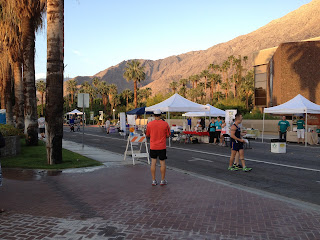Addiction is a disease that affects the entire family system. It's important for families to be educated on how to distinguish the difference between supporting their loved one's recovery and enabling their loved one in their addiction. It is vital to the recovery process to incorporate the entire family system in fighting the disease of addiction; support of the recovery process can help "raise the bottom" so the addict gets the help they need sooner. This video is a great resource for families struggling with helping an addicted person in their family. Just remember, when the family supports recovery, and doesn't enable, everyones life gets better!
Friday, May 25, 2012
Tuesday, May 15, 2012
Volunteering in the Community with Ken Seeley Recovery Community
In our efforts to help de-stigmatize addiction, and also promote recovery, Ken Seeley Recovery Community volunteers at the Palm Springs Street fair every Thursday. Volunteering visibly in the community helps the general public understand the difference between an active addict, and an addict in recovery. The guests at KSRC have built a relationship with some of the vendors at the fair who need extra help because of their age or physical ailments. Every week the vendors booths get setup on time by addicts in recovery; this helps the community understand that in recovery we can be reliable and responsible. A key piece of KSRC's volunteer regiment is wearing our "Recovery at Work" shirts. By wearing our shirts, we make ourselves easily accessible for requests from vendors and also for questions from the public regarding addiction or recovery. Just last week a young lady approached one of the guests because of their shirt. Through talking with one of the KSRC guests, the young lady ended up discovering that there is a solution to her struggle with addiction, and also made plans to attend her first AA convention with the house. Reaching addicts who are still struggling, and helping our community, that is truly "Recovery at Work".
Rich Dow, i911 Director of Services supervising the KSRC guests.
Guests unloading a root beer wagon for a vendor!
Recovery at work!
Recovery at Work shirt!
Tuesday, May 8, 2012
Heroes In Recovery 6k Run
The guests at Ken Seeley Recovery Community recently had the opportunity to volunteer at the Heroes in Recovery 6k run in Palm Springs. The guests woke up bright and early to help set up and direct the race through the Las Palmas neighborhood. Everyone from KSRC really enjoyed getting involved in some amazing service work at the event. Heroes in Recovery and Ken Seeley Recovery Community happen to share the same beliefs about recovery; it needs to be fun! That being said, the staff at KSRC loves the message Heroes in Recovery conveys in regards to becoming open and honest in a public manner about what recovery looks like. Movements like Heroes in Recovery are a fantastic way to educate the public and begin to de-stigmatize addiction. It was amazing to see so many interesting people from all walks of life at the run that were all brought together based on one common bond. The staff and guests are all looking forward to the next Heroes in Recovery event!
Volunteers setting up for the race!
Runners getting ready for the event.
Volunteer at the halfway mark.
Thursday, May 3, 2012
Don't Negotiate with the Disease
This article is fantastic! Families of those in active addiction or recovery can benefit greatly from taking advice from this authors article. I love the portion where the author states, "How do you negotiate with an addict that has no sense of justice or fair play?". This is one of the hardest struggles for parents and family members to navigate when dealing with an addicted family member. Attending Al-Anon, CoDA, and working with professionals who can provide case management and recovery monitoring services can help families avoid "negotiating with the disease" and improve their loved one's quality of life as well as their own.
Ron Grover on Negotiating Recovery

 We’ve all done it. Seldom, if ever does it work. We make deals; we are willing to sell our soul, our dignity and our future to an addict in an effort to stop the madness.
We’ve all done it. Seldom, if ever does it work. We make deals; we are willing to sell our soul, our dignity and our future to an addict in an effort to stop the madness.
My efforts to negotiate recovery involved buying things, providing gifts, paying for medical treatment, rehab and rents. All this effort is a fruitless attempt to bargain away the addiction from my son. This all happens while we enable our addicts and deny the reality.
Then we begin to get smarter about enabling and stop wasting our treasures. But all that does is lead us to a new phase of negotiating. We begin negotiating with our self. We whisper inside that if I see this and this and that then I can do this and this and that.
How do you negotiate with an addict that has no sense of justice or fair play? How can you negotiate with an addict that suffers from a disease that results in behaviors a sane person would deem insane? An addict will not and cannot negotiate away their addiction. As long as you indulge in negotiating with addiction you have everything to lose and there is nothing to gain.
So what’s the answer? You must live in the world of a reality that involves seeing the picture as it is — not how you want it to be. Stepping back and taking in the holistic nature of this disease and how it not only affects the addict but all those that they touch is the first step. From that place I was able to see that negotiating was hopeless. Then it came down to figuring out where I actually stood in relationship to the disease and my relationship with my addict.
Ron Grover
Courtesy of The Partnership at Drugfree.org
Ron Grover on Negotiating Recovery
 We’ve all done it. Seldom, if ever does it work. We make deals; we are willing to sell our soul, our dignity and our future to an addict in an effort to stop the madness.
We’ve all done it. Seldom, if ever does it work. We make deals; we are willing to sell our soul, our dignity and our future to an addict in an effort to stop the madness.My efforts to negotiate recovery involved buying things, providing gifts, paying for medical treatment, rehab and rents. All this effort is a fruitless attempt to bargain away the addiction from my son. This all happens while we enable our addicts and deny the reality.
Then we begin to get smarter about enabling and stop wasting our treasures. But all that does is lead us to a new phase of negotiating. We begin negotiating with our self. We whisper inside that if I see this and this and that then I can do this and this and that.
How do you negotiate with an addict that has no sense of justice or fair play? How can you negotiate with an addict that suffers from a disease that results in behaviors a sane person would deem insane? An addict will not and cannot negotiate away their addiction. As long as you indulge in negotiating with addiction you have everything to lose and there is nothing to gain.
So what’s the answer? You must live in the world of a reality that involves seeing the picture as it is — not how you want it to be. Stepping back and taking in the holistic nature of this disease and how it not only affects the addict but all those that they touch is the first step. From that place I was able to see that negotiating was hopeless. Then it came down to figuring out where I actually stood in relationship to the disease and my relationship with my addict.
Ron Grover
Courtesy of The Partnership at Drugfree.org
Wednesday, May 2, 2012
Life Skills Program with Intervention 911
Intervention 911 is excited to announce a
new program available to its clients; the Life Skills Program. After years
providing case management and recovery monitoring services, Intervention 911's
staff saw an opportunity to help expedite their client’s journey to living a
happy life in recovery. Addicts generally stop emotionally maturing at the age
they start using. That being said, once an addict gets treatment and starts to
live without drugs, they often have very limited basic life skills. There is a
distinct difference between an individual being abstinent from drugs and
alcohol, and individual living a life in recovery. The life skills program
intends to address this difference. The object is to asses and improve the
clients Behaviors, Attitude, Attendance, and Achievement or (B.A.A.A).
Intervention 911 life skills coaches work with the addict on core skills like
scheduling their day, shopping, self-care, finances, and navigating daily
struggles. Another key element of the program is fine tuning interpersonal
communication skills and assisting the client in meeting their career or
education goals. The life skills program is really a complete lifestyle
overhaul that focuses on emotional growth with an emphasis on responsibility.
Accountability to one of Intervention 911's life skills coaches can make all
the difference for the client’s success with personal growth. The coaches are
trained to compassionately address any non-compliance with the Life Skills
program in a non-judgmental manner. Accountability to a third party outside the
family dynamic reduces conflict and increases success all the while maintaining
the clients dignity. If you or a loved one could benefit from the Life Skills
program, please call Intervention 911 today!
866.888.4911
Subscribe to:
Posts (Atom)









